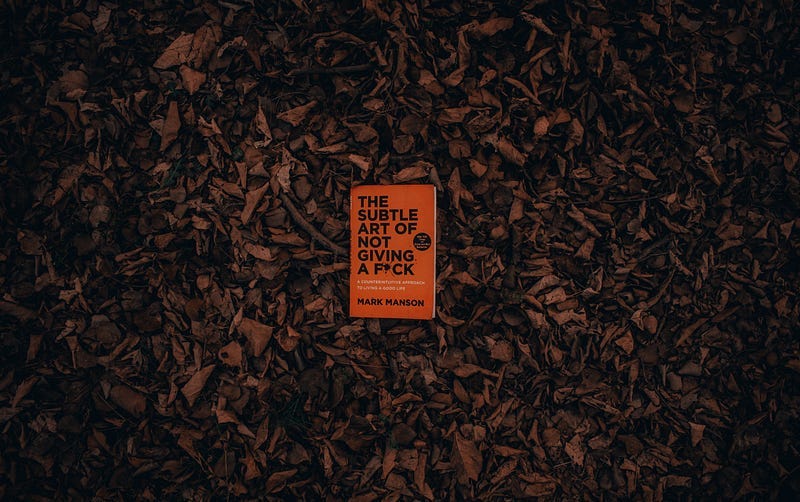The Subtle Art of Not Giving a F*ck

Intro
Mark Manson’s The Subtle Art of Not Giving a F*ck is one of the best self-development books I’ve ever read.
It’s the perfect antidote to the lost, distracted, hyper-connected modern age. If you think what you read in this summary is for you, I would highly recommend checking out the actual book.
I’ve tried to break down my insights from the book into sections with actionable steps.
Section 1: Happiness and the Paradox of Caring Less
“The key to a good life is not giving a f about more; it’s giving a f about less, giving a f only about what is true and immediate and important.”
There are only a few things in our lives that truly matter, but we waste too much time and energy on the things that don’t.
What that coworker said, how good the latest Instagram post was, and clickbaity breaking news often have 0 impact on your life.
Ruthlessly cutting out the unimportant aspects of your life frees up the time, energy, and mental headspace to focus on the truly important. And as the next section shows, the truly important is what really drives happiness.
Section 2: Happiness and Embracing Challenges
“Our problems birth our happiness, along with slightly better, slightly upgraded problems.”
Every path has problems.
Choosing to be a corporate software engineer has problems. Choosing to be an entrepreneur has problems. Choosing to be a loyal friend has problems. Choosing to be a good student has problems. Choosing to be somebody who prioritizes family has problems.
Running away from problems is pointless. No matter what you do, you can never escape them.
What you should be focusing on is finding the problems that you care about solving, and relentlessly focusing on those problems.
Section 3: Taking Responsibility
“You have to believe that you’re responsible for everything that happens in your life; good or bad.”
Only once you take responsibility for your life will you be able to take control of it.
Most people react negatively to taking responsibility because they conflate responsibility with fault.
It’s not your fault that you were bullied. It’s not your fault that you have a bad teacher or a bad boss. But it sure is your responsibility how you deal with it.
In this example, if you can take the responsibility of learning the material yourself despite having a bad teacher, you can still thrive in school.
But if you just sit around and cry about having an awful teacher, you negatively impact your mood, and your grades suffer.
When you let go of being responsible for your life, you also let go of having control of your life.
Section 4: Systems
System-Based Values
“It’s growth that generates happiness, not a long list of arbitrary achievements.”
Your happiness is highly dependent on your values.
If your standard is to be the best-selling writer in the world, a few million sales will still seem unsuccessful.
If your values are instead to produce a well-written book that provides some value to its readers, that same success suddenly generates far more happiness.
“Happiness isn’t algorithmic. Happiness comes from achieving things, solving problems, doing things you care about.”
“The best values are process-oriented. If your values are based on goals, once you accomplish those goals you have no more problems.”
Instead of focusing on milestones far out of your control, focus on growth (getting better at solving your problems).
“And if you think at any point you’re allowed to stop climbing, I’m afraid you’re missing the point. Because the joy is in the climb itself.”
Try to cultivate a sense of joy in growth at whatever you do instead of focusing on a specific target.
Truth
“You never reach truth, you just get slightly less wrong. And that’s what growth is all about.”
Fixing yourself on certain truths is dangerous because you are never truly right. Those who base their identities around a certain unshakeable “truth” are often extremists and zealots.
Not letting your concepts of what is true affect your identity allows for growth and prevents you from losing your way.
Here’s a framework from Byron Katie’s The Work to help you challenge your truths. (I first heard about this in Ali Abdaal’s newsletter.)
Is it true?
Can you absolutely know that it’s true?
How do you react when you believe that thought?
Who would you be without the thought?
Example from me:
I used to believe that watching self-help videos all the time, reading all the big self-help books, and being subscribed to all the self-help newsletters would drastically improve my life.
It took me reading this book to fully understand something I’ve been slowly realizing for a while:
“You will never be happy if you continue to search for what happiness consists of. You will never live if you are looking for the meaning of life.”
- Albert Camus
It’s better for me to live an imperfect life than to waste all my time learning how to build a perfect one.
System-Based Motivation
“Action isn’t just the effect of motivation; it’s also the cause of it.”
Everyone assumes motivation leads to action. Really, action leads to motivation.
Don’t wait around to research, get motivated, and make everything perfect.
If you’re stuck, do something. You’ll figure it out as you go along. But sitting around and waiting for motivation will get you nowhere.
Conclusion
Again, I would highly recommend checking out the actual book if you liked the ideas in the summary.
Mark Manson is a much more compelling writer than I am, and you’re more likely to derive positive change from reading his work. If you want a summary by the author himself, check out this video.

